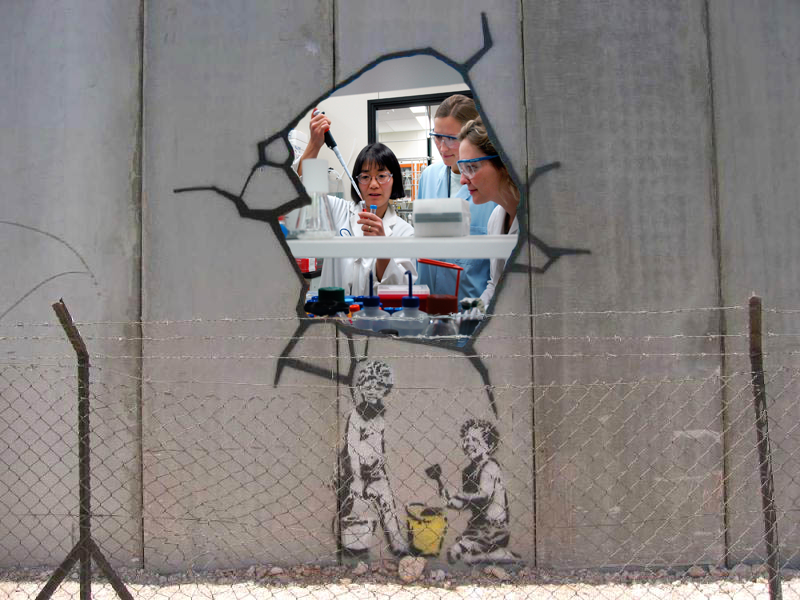Tear Down These Walls

This article originally appeared on the Nature Soapbox Science blog. I am excited to be joining the Australian Science team, and wanted to re-post this article here as it encompasses my approach to science communication, and will set the tone for future posts from me.
On a cold weeknight in late November, 1660, a dozen men gathered in the rooms at Gresham College in London to found the Royal Society. Not all of them had a scientific background; some of them were lawyers, politicians, merchants and philosophers. The one thing they all had in common was a thirst for knowledge. The formation of the Royal Society was the coming together of a group of curious gentlemen determined to promote the accumulation and dissemination of useful knowledge. It represented a paradigm shift in the practice of science. The Royal Society invented scientific publishing and peer review, two major developments that redefined science from an amateur hobby to the rigorous beast that it is today.
Two remarkable characteristics distinguished the Royal Society from the other nascent scientific societies of its time. It was genuinely international, and being of noble birth was not a requirement for membership. It aspired to the ideal of meritocracy. External factors such as nationality, race, gender and wealth did not matter. This basic premise of science, that it is and must be open to everybody, began with its founding and should continue today. While the ability to practise science now requires a formal education in scientific theory and practice, access to science should not depend on nationality, wealth, geographical location or scientific training.
Two things stand in the way of public access to science. The first is obviously the paywall: the second is something that I describe as the ‘jargon-wall’. The language of science is precise and meticulous; it has to be. Somewhere along the way, it has also become esoteric, foreign and inaccessible to the public by existing only within the confines of the ivory tower of academia. This has contributed to the chasm of scientific ignorance we see today, and it has created a deep divide that could impede human progress.

So how do we bridge that divide? Open access publications can address the paywall, by allowing anyone with an Internet connection, anywhere in the world, to access scientific discoveries. Open access is not just about giving scientists free access to the science; it is also about giving the public access to the science. However, the jargon-wall is still present, and it prevents ordinary people from understanding the research. Ask yourself, how many non-scientists would understand the average paper published in a peer-reviewed open access journal?
Open access is meaningless without a scientist to interpret the findings. Social media can be a powerful tool for science outreach because it allows a general member of the public to contact and query scientists directly. And when scientists respond, the ivory tower is torn down. This engagement is key to breaking through the jargon-wall. The open access debate is a separate issue, but I want to make the point that open access by itself is not enough to make science accessible to the public.
As scientists, when we engage with the public, the benefits reach far and wide. The primary benefit is of course that the public gets to share and be a part of the adventure that is science. The secondary but equally important benefit is the windfall profits of educating the public. The anti-science movement, including (but sadly not limited to) anti-vaccinationists, climate change deniers, evolution deniers and pseudoscience believers, feeds on ignorance. By providing access to the science, by breaking through both the paywall and the jargon-wall, we reduce that pool of ignorance that the anti-science movement relies on. By getting the public involved in the scientific adventure, we defang the anti-science movement. As a tertiary benefit, it gives us, the scientists, a much needed dose of perspective. All too often we despair over a rejected manuscript, an unsuccessful grant application, or a botched Western blot. I know I do. We forget what we love about science. By engaging with the public, they can be introduced to the wonder, while we, the scientists, are reminded of it.
As an example, I recently came across a fascinating piece of research, published in PLOS Biology, about how a dying nematode worm displays a burst of intense blue fluorescence, generated within the intestinal cells as part of the necrotic cell death pathway. The paper was titled “Anthranilate Fluorescence Marks a Calcium-Propagated Necrotic Wave That Promotes Organismal Death in C. elegans”, which is entirely appropriate for a scientific audience. However, the title alone would discourage many non-scientists from reading this fascinating paper, despite it being open access. I explained the findings, translating the jargon through a post on the social network Google+. The post generated a fascinating discussion, and I linked to the PLOS Biology paper using a URL shortener which allowed me to see how many people clicked the link to read the full open access paper. I was delighted to see over two hundred and fifty page views. How often would a peer reviewed publication, open access or not, receive that many page views from the general public?
Science is an awe inspiring, wonderful, exhilarating adventure. At last, if we have both open access, and scientists willing and able to talk to the public, to engage and to educate the public, we can level the playing field. Everyone can be a part of the adventure. Just as minds of the general population were ignited when the Royal Society began, all those years ago.
Samarasinghe B (2013-08-27 00:06:35). Tear Down These Walls. Australian Science. Retrieved: Jul 19, 2025, from https://ozscience.com/open-access-2/tear-down-these-walls/
 Follow
Follow
1 thought on “Tear Down These Walls”
Comments are closed.